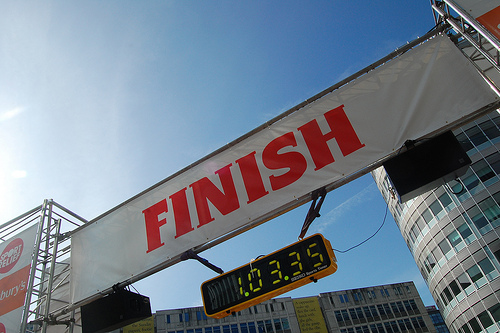
While riding the train to Union Square, one ad in particular caught my eye. A bank was sponsoring a major bike race to be held on May 5 in New York. The picture showed the starting line of the 5 Boro Bike Tour: a long shot of a Manhattan street covered by a multitude of people, a slice of the 32,000 riders who attend the event each year. Just before the starting point, two flames fire up from the entry line as the elite cyclists begin the race. At the very top of the image, the ad slogan reads “The Race of Your Life.”
The marketing strategy is outstanding of course, a big race through the city, full of excitement, fireworks and fanfare. Unfortunately, I could not help but make the leap and relate the picture and its two flames to the recent event at the finish line of the Boston Marathon. There was a time that the ending points of a race evoked emotions of exhilaration and accomplishment, but they have now been re-conceptualized and I was seeing them within a context of violence and grief.
As an amateur runner, I have crossed the marathon finish line three times. Most often, I crossed it in major pain, limping, cursing, almost fainting, and not thinking straight. Talk to any runner and they will tell you that the marathon is a journey, a small replica of life’s long road as a 26.2 mile race with ups and downs leading up to a blissful finish.
For me, the finish line has been a space of deep introspection. Imagine, you take a deep breath, you close your eyes and think about the challenges you have conquered, all in humble light. It is right by that finish line that your loved ones often await. For the past six months, they listened to your accounts of injuries and setbacks and sometimes awaited you with dinner and a warm cup of tea. Even when you struggle on the final miles, they root for you as if you are leading the pack.
Many times, their company plays as much a part in your success as your long training runs on Sundays. Every memory I have of that finish line ends with the holding of hands and with a strong hug that eases up the pain.
Seeing the ad for the bike tour on the subway led me to ask myself what will that line represent now. I wondered if media producers will no longer use the image of the finish line to attract racers, and will begin to seek other angles, focusing on images of athletes as they go through the early miles, or as they enjoy sweet treats in the water stations. I wondered this because I could not stop looking at this picture and imagining the finish line as a black hole and a place of sorrow.
Perhaps, it is just a question of time. Our healing process, I hope, will lead our collective consciousness to re-conceptualize the finish line yet again. Not as vision of horror, but as the vision of a place where our spirit thrives and survives. In that context, I can again picture myself searching for that finish line in the walls of the subway car, running a quiet and still race, and looking forward to seeing my loved ones.







Leave a Reply